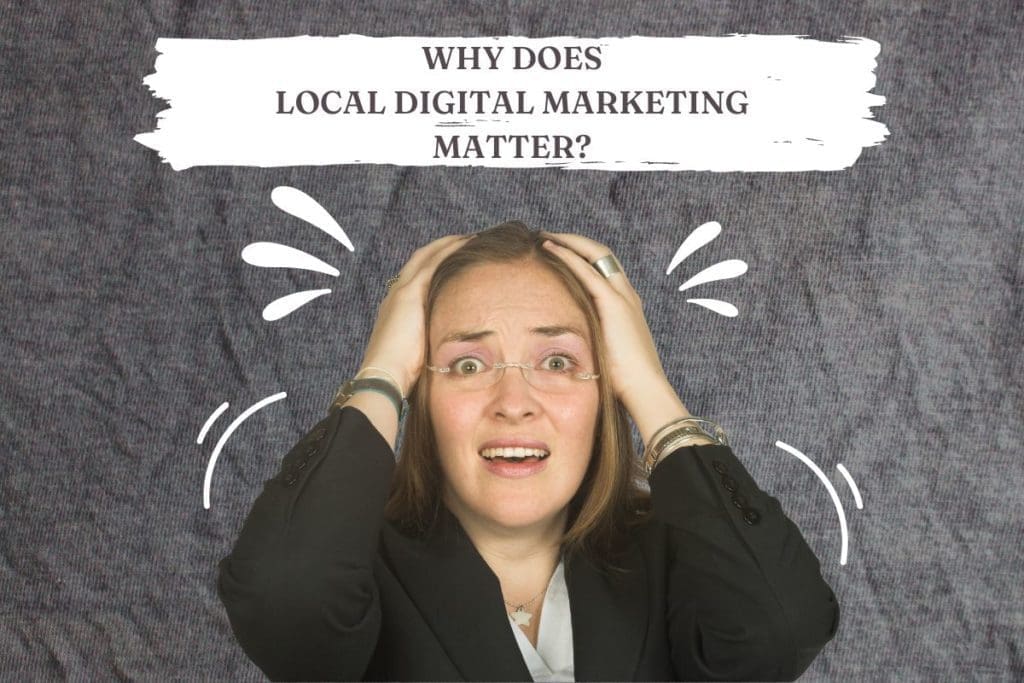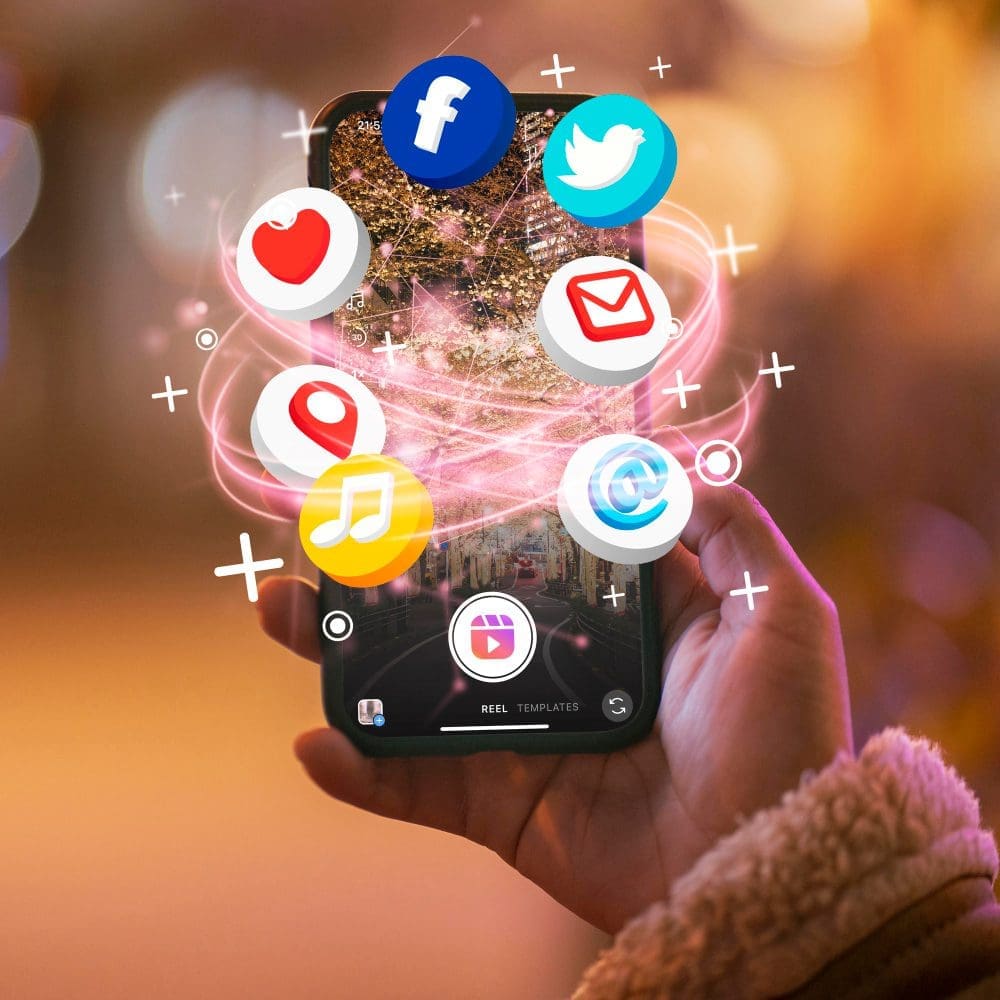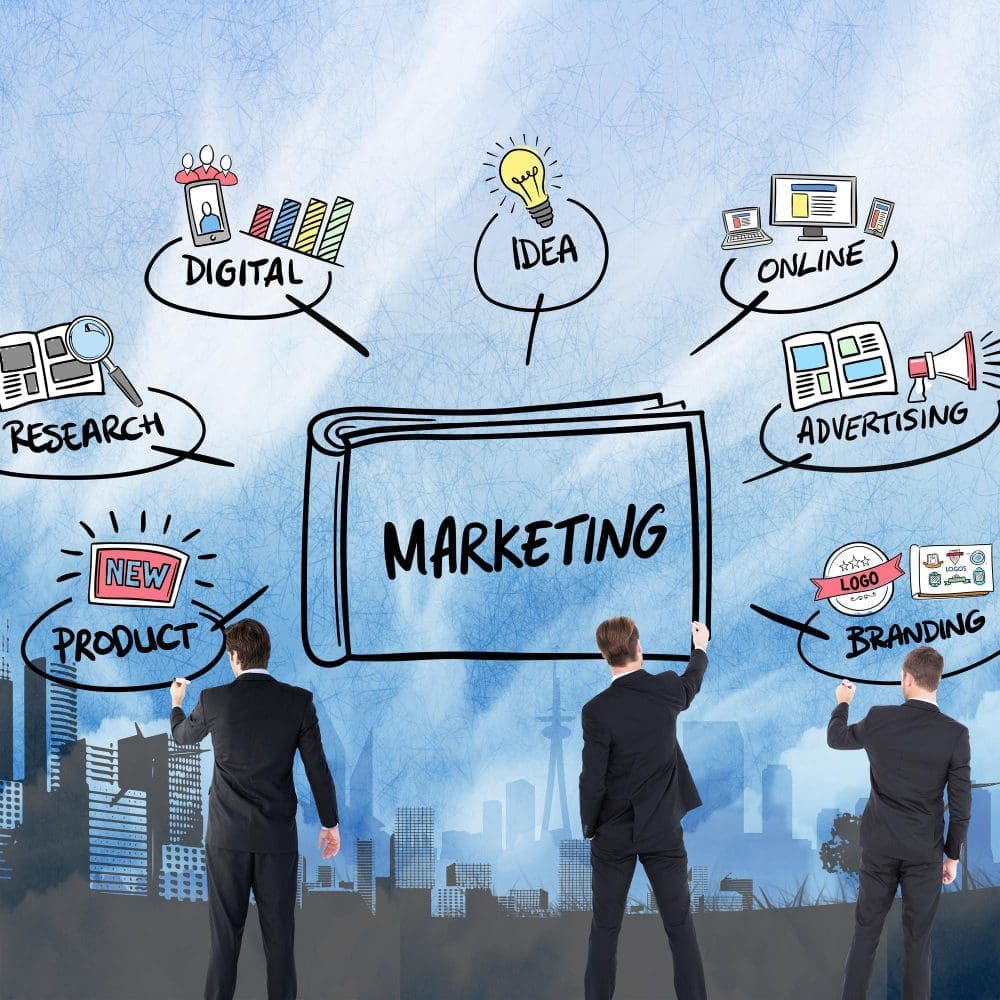Why Does Local Digital Marketing Matter?
Searching for a way to connect with customers near you? Local digital marketing has the power to make your business visible. Find out why this is a must-have strategy for increasing your customer base and achieving success. Learn how to make the most of local digital marketing tactics to get more customers to your business.

Why Does Local Digital Marketing Matter?
What is digital marketing?
Digital marketing is about utilizing digital methods and channels to promote products or services. It includes techniques such as social media marketing, search engine optimization, and email marketing.
Engaging in digital marketing allows businesses to reach more people and have an online presence. This form of marketing uses the internet and tech to get in touch with people at critical points. Businesses can target their audience through different platforms and techniques and create content that produces results.
Plus, digital marketing also enables precise targeting and personalization. With analytics and data tracking, businesses can know more about customers’ behavior and likes. This info can then be used to modify campaigns for maximum effect.
Local digital marketing is especially beneficial for small businesses in a specific area. By focusing on local people through localized SEO tactics, focused advertising, and community participation, businesses can bring people to their physical stores and make their brand well-known in the local area.
Local digital marketing matters because it helps make a personal connection with customers. By learning more about local customers’ specific needs and preferences, businesses can tailor their messages and offers to serve their target audience better.
According to Forbes, 72% of customers who do a local search visit a store within five miles of their location. This shows local digital marketing is important in driving offline sales and customer connections.
Why is digital marketing important?

Digital marketing is a must-have for businesses today.
Digital marketing is a must-have for businesses today. It helps extend the reach and engage with customers on multiple platforms. Leveraging online strategies builds brand awareness, drives sales, and keeps businesses ahead of the race.
One of the top benefits of digital marketing is its ability to target specific demographics. Companies can customize their approach through data and customer insights to get better conversion rates and ROI.
Plus, digital marketing is cost-effective for small businesses. Traditional advertising costs a lot, making it difficult for startups. But, with digital marketing tools like email campaigns and social media advertising, even those with limited resources can create powerful campaigns.
What’s more, digital marketing gives trackable results. Unlike traditional methods, online platforms offer analytics. This data allows companies to analyze their marketing efforts in real-time and make changes as necessary. By looking at metrics like website traffic, click-through rates, and customer engagement, businesses can optimize their campaigns for optimal impact.
Sweet Delights, a small bakery, is a great example of local digital marketing. Traditional advertising wasn’t bringing in many customers, so they decided to go digital. They created content highlighting treats, exclusive discounts, and more, which enticed new customers.
Their efforts paid off. Within weeks of launching the campaign, there was a surge in footfall. The owners were pleased with the response from locals, who couldn’t get enough of the delicious pastries they discovered through digital marketing.
Types of Digital Marketing
Digital marketing is a huge field with many types that are important for promoting businesses online. Let’s find out more about them!

Like a bad hair day, digital marketing works for all businesses except those who want to stay hidden online.
Marketing Category Examples
- Search Engine Optimization – Making websites better for better search engine ranking.
- Social Media Marketing – Using social media to engage and attract customers.
- Content Marketing – Creating valuable and informative content to drive traffic and grow brand reputation.
- Pay-per-click Advertising – Displaying ads on search engines and websites, paying only when clicked.
- Email Marketing – Sending promotional emails to reach potential customers.
- Influencer Marketing – Partnering with influential individuals to advertise products or services.
- Affiliate Marketing – Earning commissions by promoting other people’s products or services.
- Video Marketing – Using videos to advertise, educate, or entertain.
- Mobile Marketing – Reaching consumers through their mobile devices.
These various digital marketing techniques look after different aspects of business promotion, ensuring it is visible and seen online.
Digital marketing has been changing over time. It began in the 1990s with the internet and email communication being used for marketing. Initially, it was about banner ads and email campaigns.
As technology and consumer behavior changed, more types of digital marketing emerged. Social media platforms gained popularity in the early 2000s, bringing social media marketing and influencer collaborations.
Like a bad hair day, digital marketing works for all businesses except those who want to stay hidden online.
Does digital marketing work for all businesses?

Digital marketing is essential for businesses in our modern world.
Digital marketing is essential for businesses in our modern world. It provides different strategies and tactics to reach audiences, raise brand awareness, and grow sales. However, not all businesses reap the same rewards from digital marketing. It depends on the business, its target customers, and its aims.
Businesses in competitive industries can gain an edge with digital marketing. They can reach potential buyers and outshine their rivals by using focused online ads, SEO, and social media marketing. Digital marketing helps them show their products and services to a large audience and produce leads that can become steady customers.
Yet, some businesses may find it difficult to make use of digital marketing. Industries such as manufacturing or construction may not have much of an online presence or just serve a local crowd. Traditional marketing, like print ads or word-of-mouth, is more effective than digital techniques. These companies may have to concentrate on improving their online visibility through local directories and review sites instead of investing heavily in complicated digital campaigns.
It’s worth noting that all businesses can still get something from having an online presence, even if direct online sales aren’t a big part of their business model. A site with relevant info, contact info, and customer testimonials can be a powerful tool to build trust and credibility among potential customers. Moreover, even those targeting localized audiences can gain from active social media accounts so they can interact with their community and create brand advocates.
As per a study by HubSpot in 2020, 64% of marketers said that upping their organic presence was a top priority for creating leads. This statistic emphasizes the importance of using successful digital marketing campaigns for businesses across different industries.
What types of digital content should I create?

To attract your desired audience, it’s important to identify the types that will be most appealing to them.
To craft successful digital content, you must figure out the types that will appeal to your target audience. Think about their likes and behaviors to guide your content creation approach. Check out these key types of digital content that can help you meet your marketing goals:
- Blog Posts: Articles with valuable info on relatable topics.
- Infographics: Pictures to represent data or info, easy to comprehend and share.
- Videos: Captivating and informative clips featuring your products or services.
- Podcasts: Audio recordings with deep discussions or interviews concerning your industry.
- Ebooks: Comprehensive guides or reports with valuable knowledge for your audience.
- Case Studies: In-depth analysis and success stories on how your product or service assisted a customer.
- Whitepapers: Detailed research papers addressing industry issues or trends.
- Social Media Posts: Short, catchy updates on various social media to engage with your followers.
Apart from these types, try interactive content such as quizzes, polls, and surveys to get user participation and gather useful data.
Remember, your digital content’s success lies in providing value to your audience while linking it to your brand’s objectives and positioning.
Pro Tip: To maximize engagement, recycle existing content into different formats, like blog posts into videos or infographics into social media posts. This allows you to reach more people and keep consistency across different channels without many extra resources.
Digital marketing is like a blind date – you don’t know if you’ll get a match, but you’ve got to make a good impression to have a chance.
How to Do Digital Marketing
Digital marketing is a must-have for businesses in today’s tech-driven world.
Digital marketing is a must-have for businesses in today’s tech-driven world. It helps companies reach their target audience better and engage with them on digital platforms. To make the most of it, here’s a 6-step guide:
- Set objectives: Before jumping into digital marketing, decide what you want to achieve – Brand awareness? Website traffic? Leads? Sales?
- Know your audience: Understand who your potential customers are. Gather info about their demographics, interests, and preferences.
- Pick the right platforms: There are many digital channels for marketing – social media, search engines, email, content, etc. Choose the ones that suit your target audience.
- Make compelling content: Content helps you communicate your message effectively. Create high-quality content that offers value to your target audience.
- Implement SEO: Improve your website’s visibility in SERPs by using relevant keywords, creating backlinks, optimizing meta tags and descriptions, and enhancing user experience.
- Monitor and optimize results: Analyze the performance of your campaigns using analytics tools. Measure website traffic, engagement, conversions, and ROI. Make adjustments to optimize performance.
Digital marketing is constantly evolving. Stay updated with the latest trends to keep up with the changing times.
Digital marketing has existed since the late 1990s when businesses began exploring online advertising. With tech advances and the widespread use of digital devices, digital marketing has become an effective tool for businesses to reach their target audience and drive growth.
Digital Marketing Examples
Digital marketing examples show the strength of online strategies to reach and connect with intended audiences. These examples show the different strategies that companies in different industries use for their digital marketing campaigns.
Check out the table below for some effective digital marketing examples:
| Digital Marketing Example | Description |
|---|---|
| Social Media Advertising | Utilize platforms like Facebook, Instagram, and Twitter to promote products or services, target specific demographics, and drive website traffic. |
| Content Marketing | Create and share valuable content such as blog posts, videos, and infographics to attract and engage potential customers. |
| Search Engine Optimization (SEO) | Optimize website content to improve its visibility on search engine results pages and drive organic traffic. |
| Email Marketing | Send targeted emails with personalized offers or information to nurture leads and build customer relationships. |
| Influencer Marketing | Collaborate with influential individuals in a given industry or niche to promote products or services to their audience. |
| Pay-per-Click Advertising (PPC) | Place ads on search engines or other websites and pay only when a user clicks on the ad, driving immediate traffic to a website. |
It is noteworthy that these are only a few examples. Each business must carefully consider the methods most suit their goals and target audience.
It is also important to stay up-to-date with emerging trends and technologies. Applying innovative strategies can give businesses an edge in the ever-changing digital landscape.
The impact of digital marketing has grown considerably over time. As more people gain access to and rely on the internet for various purposes, businesses have seen the need to have an online presence.
At first, digital marketing was limited to basic websites. But then extended to email campaigns, banner ads, and SEO. With the emergence of social media platforms like Facebook and Instagram, brands got direct access to millions of potential customers.
Now, digital marketing has changed the way businesses communicate with customers. The growth of mobile devices and more advanced targeting options have further revolutionized this area, allowing for customized and highly targeted marketing campaigns.
Put everything you’ve got into your digital marketing strategy because, in the online world, even rocks can bring leads!
Integrate Digital Marketing Into Your Strategy

Incorporating digital marketing into your business strategy is crucial in today’s world.
Integrating digital marketing into your strategy is indispensable for businesses today. It gives you a wider reach and the ability to engage with potential customers personally. Here are six key points to consider when implementing digital marketing into your entire strategy:
- State your goals: Before delving into digital marketing, clearly mark your goals. Setting certain goals will direct your strategy, whether it’s brand recognition, lead production, or more online sales.
- Recognize your target audience: Comprehending who your audience is will assist in customizing your digital marketing attempts to contact them responsibly. Do market research and create consumer profiles to know their demands and preferences.
- Pick the correct platforms: There are numerous digital marketing channels available, such as social media, email marketing, search engine optimization (SEO), and content marketing. Select the platforms that conform to your goals and correspond with your target audience.
- Generate captivating content: Content is king in the digital world. Draft high-quality and pertinent content that teaches, entertains, or solves issues for your audience. This will build trust and position you as an industry specialist.
- Enhance search engines: Execute SEO strategies to increase your visibility on search engine results pages (SERPs). Check out keywords related to your industry and integrate them naturally into your website’s content.
- Examine and adjust: Monitor the performance of your digital marketing campaigns using analytics tools. This data will offer insights into what works well and what requires improvement. Be ready to make necessary changes along the way.
Moreover, staying informed with the most recent digital marketing trends is essential to refine and improve your strategies continually.
By following these tips, you can employ digital marketing resourcefully and effectively.
Pro Tip: Keep in mind to frequently evaluate and optimize your digital marketing initiatives to remain ahead of the competition and constantly bring about results.
To wrap this up…
Unlock the potential of your business with the power of local digital marketing! From setting clear goals to crafting compelling content and monitoring results, this dynamic strategy will connect you with your target audience, boost your visibility, and propel you toward unrivaled success. Embrace the digital age and seize the incredible opportunities that local digital marketing offers – your business transformation awaits!
Frequently Asked Questions
Q: Why does local digital marketing matter?
A: Local digital marketing is crucial for businesses to reach and engage with their target audience in a specific geographical area. It increases their visibility, attracts local customers, and drives foot traffic to their physical stores.
Q: How does local digital marketing help businesses?
A: Local digital marketing helps businesses by enhancing their online presence through strategies like local search engine optimization (SEO), online directories, geotargeted ads, and social media marketing. This ensures that their brand is visible to potential customers in the local area.
Q: Can local digital marketing improve customer trust?
A: Yes, local digital marketing can improve customer trust. When a business actively engages with the local community online, responds to reviews and queries, and showcases local partnerships, it builds credibility and fosters trust among potential customers.
Q: Is local digital marketing cost-effective?
A: Local digital marketing can be highly cost-effective compared to traditional marketing methods. Businesses have the ability to target a specific local audience rather than wasting resources on a broader reach. It also allows for precise tracking and analytics to optimize marketing campaigns.
Q: How can local digital marketing boost sales?
A: By targeting local customers through various digital marketing channels, businesses can drive more qualified leads and convert them into sales. Local SEO, targeted ads, and location-based promotions are effective strategies for boosting sales for businesses.
Q: What are some essential elements of a local digital marketing strategy?
A: Some essential elements of a local digital marketing strategy include optimizing website content with local keywords, creating and maintaining a Google My Business profile, obtaining online reviews, leveraging local directories and listings sites, and engaging with the community through social media.

